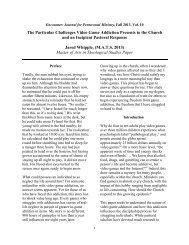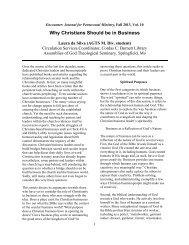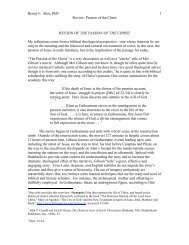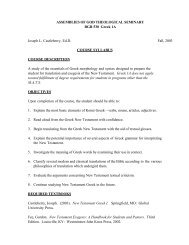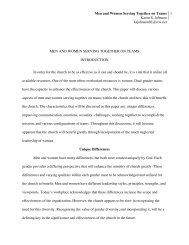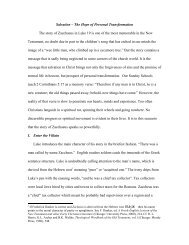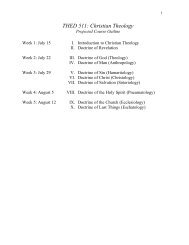Encounter: Journal for Pentecostal Ministry - Assemblies of God ...
Encounter: Journal for Pentecostal Ministry - Assemblies of God ...
Encounter: Journal for Pentecostal Ministry - Assemblies of God ...
Create successful ePaper yourself
Turn your PDF publications into a flip-book with our unique Google optimized e-Paper software.
elate to the integrity with which one<br />
handles his or her finances.<br />
A significant relationship exists between this<br />
story and the parable <strong>of</strong> “the unjust steward”<br />
found in Luke 16:1-15. In this story, the<br />
steward fails to manage his master‟s funds<br />
with honesty. In the end, he finally attempts<br />
to use his entrusted wealth <strong>for</strong> the welfare <strong>of</strong><br />
poor debtors by decreasing their debt. 64 In<br />
verse 9, Jesus states, “I tell you, use worldly<br />
wealth to gain friends <strong>for</strong> yourselves, so that<br />
when it is gone, you will be welcomed into<br />
eternal dwellings.” Kim concludes,<br />
“According to 16:9 he would have been<br />
received into the eternal habitations by the<br />
help <strong>of</strong> his witnesses, that is, the recipients<br />
<strong>of</strong> his benevolence on earth.” 65 This concept<br />
contrasts with the latter parable <strong>of</strong> the rich<br />
ruler in 16:19-31, in which the rich ruler<br />
uses his wealth <strong>for</strong> the interest <strong>of</strong> selfish<br />
ends. 66 “If we apply 16:9 to this case, he is<br />
not received into the eternal habitations,<br />
because no friend would witness to his<br />
benevolence on earth, and he eventually<br />
falls into hell, as described in 16:23. In this<br />
sense, 16:9 can be regarded as a theme verse<br />
which plays an important role in unfolding<br />
the implication <strong>of</strong> both parables.” 67<br />
Luke‟s Gospel emphasizes particular<br />
concern <strong>for</strong> the poor in the story <strong>of</strong><br />
Zacchaeus (Luke 19:1-10). Jesus welcomes<br />
Zacchaeus, a tax collector, despite his<br />
wayward lifestyle <strong>of</strong> manipulation and<br />
selfish greed. Zacchaeus shocks the crowd<br />
by standing up and proclaiming, “Look,<br />
Lord! Here and now I give half <strong>of</strong> my<br />
possessions to the poor, and if I have<br />
cheated anybody out <strong>of</strong> anything, I will pay<br />
back four times the amount” (v. 8). Jesus<br />
responds by stating, “Today salvation has<br />
come to this house, because this man, too, is<br />
a son <strong>of</strong> Abraham. For the Son <strong>of</strong> Man came<br />
to seek and to save what was lost” (vv. 9-<br />
10). One could conclude that Jesus, in part,<br />
10<br />
associates salvation with the desire to give<br />
to the poor and aid others who are in need.<br />
Luke utilizes Zacchaeus as an example to be<br />
emulated by anyone who comes to<br />
experience the salvation <strong>of</strong> <strong>God</strong> and give<br />
generously to the poor. 68 If the “chief tax<br />
collector” (v. 1) willingly provided <strong>for</strong> the<br />
needy, surely the wealthy elite could learn to<br />
generously care <strong>for</strong> others.<br />
While many possible examples regarding<br />
care <strong>for</strong> the poor exist in Luke‟s writing, the<br />
previous stories stand as sufficient witnesses<br />
to establish Lukan concern <strong>for</strong> ministry to<br />
the marginalized. Luke obviously desired to<br />
emphasize care <strong>for</strong> the poor and<br />
downtrodden, especially from an economic<br />
standpoint. He records much <strong>of</strong> Jesus‟<br />
sayings regarding this thought process, and<br />
he carefully includes many instances that<br />
exemplify concern <strong>for</strong> the poor. Luke not<br />
only focuses on concern <strong>for</strong> the poor in the<br />
teachings <strong>of</strong> Christ in his Gospel, but he<br />
continues this theme in Acts as well.<br />
Throughout Acts, one can see concern <strong>for</strong><br />
the poor exemplified in the Early Church<br />
and in the lifestyle <strong>of</strong> the apostles.<br />
Church’s Historical Response in the Book<br />
<strong>of</strong> Acts<br />
Historical Examples <strong>of</strong> Communal<br />
Benevolence Commended<br />
Because the book <strong>of</strong> Acts is <strong>of</strong>ten revered as<br />
an historical account rather than a<br />
theological treatise, one can conclude that<br />
Luke sought to exemplify the theological<br />
principles found in his Gospel with the<br />
circumstances and responses <strong>of</strong> the Early<br />
Church. As Stanley Horton notes, “What we<br />
find in Acts is the outworking <strong>of</strong> the Gospel<br />
as recorded by Luke,” 69 clearly<br />
demonstrating Luke‟s message <strong>of</strong> Christ‟s<br />
life, death, and resurrection throughout the<br />
Church‟s first generation. The book <strong>of</strong> Acts<br />
does not present any clear exhortations




